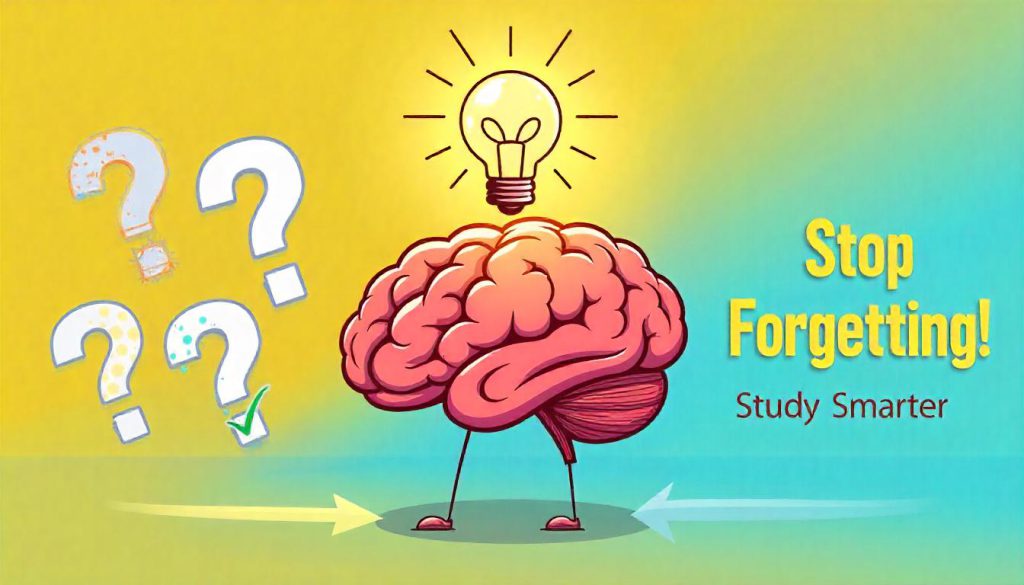You may feel as though you are making progress during your study sessions, especially after spending so long with your notes, feeling accomplished as you burn through a stack of highlighters. But come the day of the exam your mind is completely blanked out. Sound relatable? Well, this is not solely your problem. Every student encounters the problem of not being able to recall information for a test, but this has nothing to do with your studying abilities. This has to do with understanding how the human brain works—and how you can work with it. This article will explain why the brain is unable to retain information for long periods and offer useful tips that are grounded in research. Ready to learn how to make your information durable? Let’s get started.
The Forgetting Curve: Your Brain’s Stealthy Trap
Ever wonder why you feel like you are unable to recall information given during the lectures last week? That is what the forgetting curve refers to, a theory that describes the rate at which the brain forgets information. Without additional review, a person might forget up to 50% of new information a day later. This is the root of why cramming the night before an exam is pointless. You can overcome the curve when trying to beat the brain into believing you are trying to retain information by using special techniques. Stay tuned to find out more.
The Myth of Passive Learning
It’s a tough reality: not all forms of studying are equal. While highlighting, rereading, or copying notes might feel productive, it’s akin to ‘spinning your wheels in mud’ – you’re going nowhere. These passive activities are particularly unproductive because they do not put any mental effort toward long-term information retention. They, rather, create a false illusion of mastery, which would eventually be devastating in the case where you find yourself unable to recall key concepts during a test; blindsiding. Effective studying in this context means ‘active engagement’.
Active Recall: Your Memory’s Best Friend
Now, envision attempting to study by closing your book and recalling the content as opposed to reading it directly: what are the main points? What’s the formula again? That is active recall, and it gets even better. Active recall is effective because of the memory retrieval process it fosters. It reinforces the brain pathways responsible for retaining memories; a very beneficial effect, because information retention is what studying is all about. Put this to the test: Try writing down everything you can remember without looking after finishing a chapter. If you find yourself struggling, rejoice. This means there are gaps that need to be revisited. While this approach is demanding, heavily so, it is equally useful.

The Feynman Technique: Teach to Learn
Ever tried explaining some complicated idea to a friend, only to realize the understanding you thought you had was actually superficial? Well, that is the Feynman Technique at work. Choose a subject and try to teach it as if you are speaking to a curious 5-year-old. If you stumble or get stuck along the way, you will know you need to relearn that part. This technique works wonders for explaining the mental blocks you face and helps you study without feeling burdened. There’s an added benefit: Teaching you to others (even if it’s only for the sake of it), improves your confidence immensely.
Spaced Repetition: Study Smarter, Not Longer
Pacing does not help when preparing for a test. It may get you through a short-lived quiz, but it’s unusable for long-term memorization. This is where spaced repetition comes in, a technique in which you rehearse the material in short, spaced-out intervals—like today, two days later, and then a week afterward. This method helps pace your brain as it collects and reinforces memories over time. Try creating a roadmap with flashcards or mobile apps to funnel in concept images, and watch how the ideas that once dulled now feel effortless. It’s akin to regularly watering a plant instead of dousing it all at once.
Mix It Up: Diverse Study Strategies
To ensure your brain stays active, do not get trapped in a single study method. Rather than only rereading your notes, try incorporating flashcards, self-assessment tests, or even teaching the content to someone else. Repeated engagement solidifies memory—an active recall adds a layer of value. You might also explain the concept to a peer or create a quiz designed for yourself. Enhanced effort spent on recall fortifies retention, and varying study methods mitigates monotony.
Key Takeaways
- Beat the Forgetting Curve: Review material regularly to keep it fresh—don’t let your brain hit the reset button.
- Ditch Passive Learning: Highlighting and rereading feel good but don’t stick. Focus on active strategies instead.
- Use Active Recall: Quiz yourself without notes to strengthen memory and spot weak areas.
- Try the Feynman Technique: Explain concepts simply to deepen understanding and build confidence.
- Embrace Spaced Repetition: Study in short, spaced-out bursts to lock in knowledge for the long haul.
- Vary Your Methods: Mix flashcards, practice tests, and teaching to keep your brain engaged and learning fun.
Make It Your Own
Studying isn’t one-size-fits-all, and that’s okay. Maybe active recall feels intense at first, or spaced repetition takes some planning. Experiment with these techniques and find what clicks for you. The goal isn’t perfection—it’s progress. By shifting how you study, you’re not just memorizing facts; you’re building skills that make learning easier, less stressful, and even a little exciting. So, what’s one study habit you’re ready to rethink? Try one of these strategies this week, and see how it transforms your next study session. You’ve got this!
